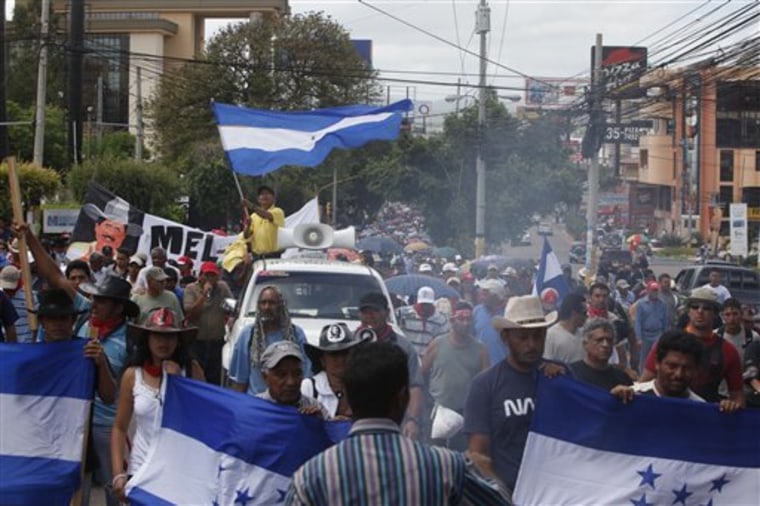A Honduran Supreme Court official said Tuesday that political amnesty for ousted president Manuel Zelaya is possible, adding to hints that negotiators are seeking a compromise to a standoff caused by a coup.
Supreme Court spokesman Danilo Izaguirre told The Associated Press that the government "could push for political amnesty in favor of Zelaya and others involved in the problem."
But he said that decision would be up to lawmakers and it would only be for political crimes.
Secretary of State Hillary Rodham Clinton said Tuesday that Costa Rican President Oscar Arias will serve as international mediator in the Honduran political crisis.
Clinton made the announcement at the State Department after meeting privately with Honduran President Manuel Zelaya, who was forced into exile on June 28.
She said Zelaya as well as the politician who took over as Honduran leader, Roberto Micheletti, agreed to the Arias role as mediator. She said Arias would work on the problem from Costa Rica, not in Honduras.
Clinton noted that Arias won the Nobel Peace Prize in 1987 for helping broker an end to Central America’s civil wars. She said she spoke to him earlier Tuesday.
“He is the natural person to assume this role,” she told reporters.
Clinton also called on all parties to refrain from further violence in an effort to resolve the political crisis.
She said her meeting with Zelaya was productive.
“I reiterated to him that the United States supports the restoration of the democratic, constitutional order in Honduras,” she said.
Obama weighs in from Moscow
In Moscow, President Barack Obama said his administration’s support for Zelaya, the deposed left-leaning politician who often criticized Washington, was emblematic of his administration’s foreign policy.
“America cannot and should not seek to impose any system of government on any other country, nor would we presume to choose which party or individual should run a country,” Obama said in a speech in the Russian capital. “And we haven’t always done what we should have on that front.”
“Even as we meet here today, America supports now the restoration of the democratically elected president of Honduras, even though he has strongly opposed American policies,” he said.
“We do so not because we agree with him,” Obama said of Zelaya. “We do so because we respect the universal principle that people should choose their own leaders, whether they are leaders we agree with or not.”
The administration has offered only lukewarm support for Zelaya — aimed more at bolstering his legal status as Honduras’ duly elected president than supporting him personally.
Zelaya, a wealthy rancher who moved to the left after his election and allied himself with Venezuelan President Hugo Chavez, was ousted on June 28 and sent into exile. He made an unsuccessful attempt to return home over the weekend and said Monday in Nicaragua that he hoped to win greater U.S. support for efforts to regain power.
Zelaya is opposed by all branches of the Honduran government as well as the military, and has even alienated leaders of his own party, which supported the congressional vote to install Micheletti as interim president.
But Zelaya has won backing from the Organization of American States, which suspended Honduras’ membership on Saturday, and other foreign governments, including the U.S., which have threatened trade sanctions against the country.
Compromise possible option
One option being considered to end the crisis is to try to forge a compromise between Zelaya, Micheletti and the Honduran military under which the ousted president would be allowed to serve out his remaining six months in office with limited powers, according to a senior U.S. official.
Zelaya, in return, would pledge to drop his aspirations for a constitutional change that might allow him to run for another term, said the official, who spoke on condition of anonymity because of the sensitive nature of the diplomatic exchanges.
Micheletti has vowed not to negotiate until “things return to normal.” The new government has threatened to arrest Zelaya for 18 alleged criminal acts, including treason and failing to implement more than 80 laws approved by Congress since he took office in 2006.
Michelletti’s interim Honduran government — named by Congress to replace Zelaya’s administration after a fight over his effort to stage a constitutional referendum that the Supreme Court ruled illegal — has been steadfast in saying he would not be allowed to return. It extended the closure of the country’s main airport through Friday and parked an old plane across the runway to emphasize the point.
His supporters, meanwhile, said they would step up protests by taking their fight nationwide, including blocking major highways and border crossings to impede trucks delivering fuel and merchandise.
